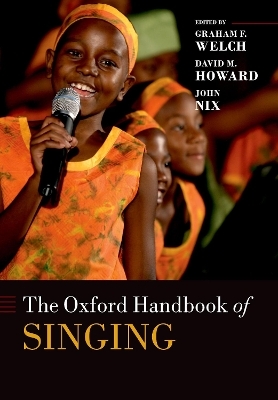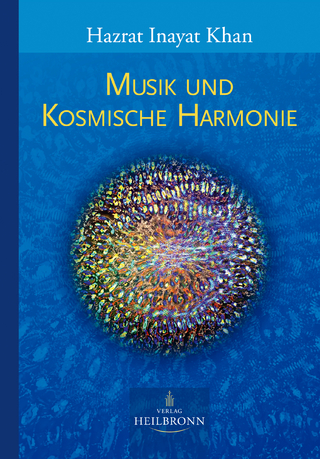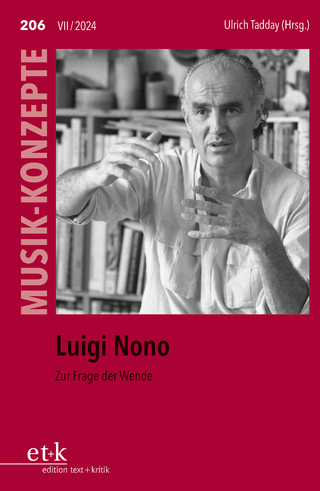
The Oxford Handbook of Singing
Oxford University Press (Verlag)
978-0-19-289418-2 (ISBN)
Singing has been a characteristic behaviour of humanity across several millennia. Chorus America (2009) estimated that 42.6 million adults and children regularly sing in one of 270,000 choruses in the US, representing more than 1:5 households. Similarly, recent European-based data suggest that more than 37 million adults take part in group singing.
The Oxford Handbook of Singing is a landmark text on this topic. It is a comprehensive resource for anyone who wishes to know more about the pluralistic nature of singing. In part, the narrative adopts a lifespan approach, pre-cradle to senescence, to illustrate that singing is a commonplace behaviour which is an essential characteristic of our humanity.
In the overall design of the Handbook, the chapter contents have been clustered into eight main sections, embracing fifty-three chapters by seventy-two authors, drawn from across the world, with each chapter illustrating and illuminating a particular aspect of singing. Offering a multi-disciplinary perspective embracing the arts and humanities, physical, social and clinical sciences, the book will be valuable for a broad audience within those fields.
Graham Welch PhD has held the UCL Institute of Education (formerly University of London) Established Chair of Music Education since 2001. He is a Past President of the International Society for Music Education (ISME) (2008-2014) and elected Chair of the internationally based Society for Education, Music and Psychology Research (SEMPRE). He holds Visiting Professorships at universities in the UK and overseas and is a former member of the UK Arts and Humanities Research Council (AHRC) Review College for Music (2007-2015). Publications number approximately three hundred and fifty and embrace musical development and music education, teacher education, the psychology of music, singing and voice science, and music in special education and disability. David M Howard was elected Fellow of the Royal Academy of Engineering in 2016 and in that same year he became the Founding Head of the new department of Electronic Engineering at Royal Holloway, University of London, where he has set at its heart the principle of nurturing creativity in the context of group working for practical projects in each of the first two years. This is supported with a creative thinking space, prototyping lab and fabrication lab with 3-D printers and laser cutting machines for realising prototype designs. He has been Editor-in-Chief of Logopedics, Phoniatrics, Vocology and is on the Editorial Boards of Journal of Voice, Forensic Linguistics, Organised Sound, International Journal of Research in Choral Singing and Journal of Interdisciplinary Music Studies. In 2014, David was made an Honorary Member of the Association of Croatian Choral Directors in which guise he acted as a judge for the International choir competition in %Sibenik in Croatia in May 2018. John Nix has a bachelor of music (voice performance, University of Georgia), a master of music education (arts administration, Florida State University), a master of music (voice performance, University of Colorado), and a certificate in vocology (University of Iowa). He is professor of voice and voice pedagogy at the University of Texas-San Antonio, and has an adjunct appointment in the Department of Speech Language Pathology at the University of Texas Health Sciences Center in San Antonio. His mentors include Barbara Doscher (singing, pedagogy) and Ingo Titze (voice science). His students have sung with the Santa Fe, Arizona, Chautauqua, St. Louis, Nevada, Omaha, and San Antonio opera companies, and two of his current or past students have been master teachers in the NATS Intern Program. In addition to his active voice teaching studio, he performs research in voice pedagogy, literature, and acoustics, having produced 38 published articles and 8 book chapters.
PART 1: The Anatomy and Physiology of Singing
1: Gillyanne Kayes: Structure and Function of the Singing Voice
2: Tara K Stadelman-Cohen and Robert E Hillman: Voice Dysfunction and Recovery
3: John S Rubin and Ruth Epstein: The Healthy Voice, Lifestyle and Voice Protection (including Exercise, Body Work and Diet)
4: Filipa M B Lã and Brian P Gill: Physiology and its Impact on the Performance of Singing
PART 2: The Acoustics of Singing
5: Alan Watson: Breathing in Singing
6: Christian T Herbst, David M Howard and Jan G Svec: The Sound Source in Singing: Basic Principles and Muscular Adjustments for Fine-tuning Vocal Timbre
7: Brad Story: The Vocal Tract in Singing
8: Johan Sundberg: The Acoustics of Different Genres of Singing
9: Desmond Sergeant: The Developing Voice
10: David M Howard and Eric J Hunter: Perceptual Features of Singing
11: Harald Jers: The Impact of Location on the Singing Voice
PART 3: The Psychology of Singing
12: Boris A Kleber and Jean Mary Zarate: The Neuroscience of Singing
13: Johan Sundberg: Intonation in Singing
14: Eduardo Coutinho, Klaus R Scherer and Nicola Dibben: Singing and Emotion
15: Evangelos Himonides: Perceived Quality of a Singing Performance: The Importance of Context
16: Karen Wise: Defining and Explaining Singing Difficulties in Adults
17: Simone Dalla Bella: Vocal Performance in Occasional Singers
18: Graham F Welch and Costanza Preti: Singing as Inter- and Intra-personal Communication
19: Annabel J Cohen and Karen M Ludke: Digital Libraries for Singing: The Example of the AIRS Project
PART 4: The Development of Singing across the Lifespan
20: Robert Walker: Socio-cultural, Acoustic, and Environmental Imperatives in the World of Singing
21: Sheila C Woodward: Fetal, Neonatal and Early Infant Experiences of Maternal Singing
22: Sandra E Trehub and Helga Rut Gudmundsdottir: Mothers as Singing Mentors for Infants
23: Margaret S Barrett: Singing and Invented Song-making in Infants and Young Children's Early Learning and Development: from Shared to Independent Song-making
24: Valentine Harding: Children Singing: Nurture, Creativity, and Culture. A Study of Children's Music-making in London, UK, and in West Bengal, India
25: Graham F Welch: Singing and Vocal Development
26: Jenevora Williams and Scott Harrison: Boys' Singing Voice Change in Adolescence
27: Lynne Gackle: Adolescent Girls' Singing Development
28: Diana Parkinson: The Effects of Gender on the Motivation and Benefits Associated with Community Singing in the UK
29: Jane Davidson and Lynne Murray: Voice Management and the Older Singer
PART 5: Singing Pedagogy
30: John Nix: Systematic Development of Vocal Technique
31: Susan Knight: Addressing the Needs of the Adult "Non-Singer" ("NS")
32: Jean Callaghan: Teaching the Professional Singer
33: Alma Thomas: Mental Preparation for the Performer
34: Mary King and John Nix: Conservatory Teaching and Learning
35: Jeremy Fisher, Gillyanne Kayes and Lisa Popeil: Pedagogy of Different Sung Genres
36: Michael Edward Edgerton: The Extra-normal Voice
37: Yang Yang, Aaron Carter-Enyi, Nandhu Radhakrishnan, Sophie Grimmer, and John Nix: Vocal Music and Pedagogy of Chinese, African and Indian Genres
PART 6: The Collective 'Choral' Voice
38: Ursula Geisler and Karin Johansson: Contemporary Concepts and Practices of Choral Singing
39: Joy Hill: The Youth Choir
40: Timothy Day: Cultural History and a Singing Style: "The English Cathedral Tradition"
41: Colin Durrant and Maria Varvarigou: Perspectives on Choral Conducting: Theory and Practice
42: Jane Davidson and Robert Faulkner: Group Singing and Social Identity
43: David M Howard: Intonation and Staying in Tune in A Cappella Choral Singing
44: Dag Jansson: Choral Singers' Perceptions of Musical Leadership
PART 7: The Wider Benefits of Singing
45: Stephen Clift and Rebekah Gilbert: Can Singing have a Beneficial Effect on Lung Function and Breathing for People with Respiratory Illness?
46: Jane W Davidson and Sandra Garrido: Singing and Psychological Needs
47: Töres Theorell: The Effects and Benefits of Singing Individually and in a Group
48: June Boyce-Tillman: Unchained Melody: The Rise of Orality and Therapeutic Singing
PART 8: Singing and Technology
49: Harm K Schutte: Historical Approaches in Revealing the Singing Voice, Part 1
50: Harm K Schutte: Historical Approaches in Revealing the Singing Voice, Part 2
51: Evangelos Himonides: Ave Verum Pentium: Singing, Recording, Archiving and Analysing within the Digital Domain
52: Garyth Nair (decd), David M Howard, and Graham F Welch: Practical Voice Analyses and their Application in the Studio
53: Peter Pabon, David M Howard, Sten Ternström, Malte Kob and Gerhard Eckel: Future Perspectives
| Erscheinungsdatum | 15.01.2021 |
|---|---|
| Reihe/Serie | Oxford Library of Psychology |
| Verlagsort | Oxford |
| Sprache | englisch |
| Maße | 170 x 243 mm |
| Gewicht | 2164 g |
| Themenwelt | Kunst / Musik / Theater ► Musik ► Musiktheorie / Musiklehre |
| Geisteswissenschaften ► Psychologie ► Biopsychologie / Neurowissenschaften | |
| Naturwissenschaften ► Biologie ► Humanbiologie | |
| Naturwissenschaften ► Biologie ► Zoologie | |
| ISBN-10 | 0-19-289418-8 / 0192894188 |
| ISBN-13 | 978-0-19-289418-2 / 9780192894182 |
| Zustand | Neuware |
| Informationen gemäß Produktsicherheitsverordnung (GPSR) | |
| Haben Sie eine Frage zum Produkt? |
aus dem Bereich


